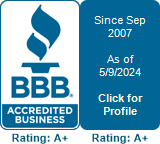What Is Accrual Accounting? Should Your Business Use It?

Are you considering using accrual-based accounting for your small business? Some businesses must use this method, but many others have the choice. The decision between using cash and accrual accounting affects how and when your revenue is recorded.
To help you make the best decision about accounting methods, here's what you need to know about accrual accounting and how it might be important for your business.
What Are the Accounting Methods?
There are two main methods for recording your company's revenue and its expenses. The first is the cash method of accounting. This simply records revenue when you receive the money and expenses when you pay the money. It's simple and often the go-to option for small-business entrepreneurs.
The other choice is called the accrual method. With this system, the company matches the reporting of revenue and expenses with when the business gets the benefit of these. For instance, once you send out an invoice for finished goods, you may report that income even before the customer's check arrives. This is because you have an unencumbered right to the revenue earned.
Which Businesses Must Use Accrual Accounting?
Some businesses are required to use the accrual method, at least for a portion of their operations. Generally, this includes any company that maintains inventory. This is in order to match up the purchase and maintenance of inventory with the production of and payment for finished goods.
In addition, you may have to use accrual accounting if your business is a C corporation or your revenue is greater than $5 million annually. When corporations and larger businesses use the same accounting methods, you can more easily and accurately compare companies' profits, losses, and accounting standards.
Why Should You Choose Accrual Methods?
If you're not subject to this requirement, should you choose accrual accounting anyway? First, accrual accounting is a good idea if you have significant revenue or expenses that you prepay. For example, if you prepay for annual insurance, cash accounting would show a large expense in January but no insurance costs for the rest of the year. Accrual accounting more accurately reflects your ongoing insurance costs.
Many businesses buy and sell items or services on credit. They may receive the items 30, 60, or even 90 days before an invoice is due. With cash accounting, you may report the cost you incurred to make something several months before or after you recognize the sale. Your books would be inaccurate, and your decision-making information would be out-of-date unless you accrue these items to match them within periods.
Accrual bookkeeping can also help a business that often does work on long-term contracts or large projects. For example, a construction company that does projects over the course of 3, 6, or even 12 months may buy materials months before they use them or before they earn the accompanying revenue. By employing accrual methods, you keep expenses and earned income in line so you know how the project really is.
Finally, a business that grows and thrives may have to switch to accrual accounting once it reaches certain thresholds. If you plan to hit that $5 million revenue threshold soon, for instance, a switch to accrual methods now is a proactive move that makes future growth less disruptive.
Do you want to know more about whether you must - or should - use accrual bookkeeping? Start by meeting with the accounting team at Quality Bookkeeping Services Inc. today. We will guide you through this decision and help you implement the best choice for your company. Call to make an appointment. We look forward to helping you with your accounting.













